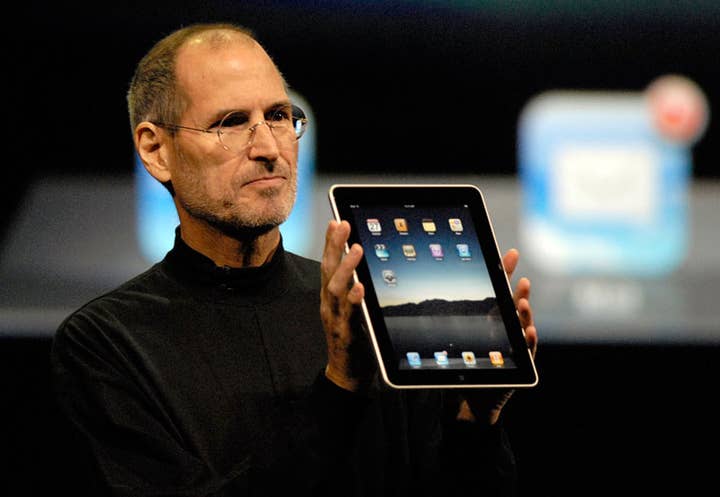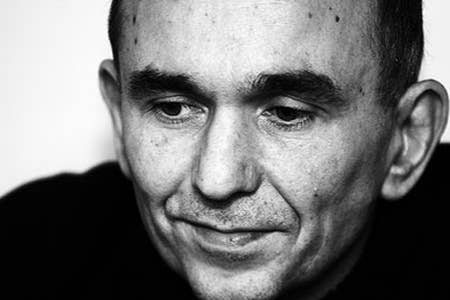Peter Molyneux: Big Ideas, Bigger Problems
The veteran designer on the difficulties of virtual cubes, social games, and the industry's increasingly out-dated approach to hardware
Peter Molyneux is in a reflective mood. After several months of talking to the press about 22Cans' debut project, he finally unveiled the first real-time demo of Curiosity to the enthusiastic attendees of Unity Technologies' Unite conference in Amsterdam.
Predictably, Molyneux fears his hyperbolic tendencies got the better of him, elevating his first "experiment" to a level of expectation he can't hope to satisfy. The cube's mysterious and potentially life-changing centre notwithstanding, the reality is very different: Curiosity is all about aesthetic simplicity, certainly, but the user experience, which shifts and changes as each of the cube's layers is peeled away, suggests a far richer experience than that described in his initial pitch. For the Peter Molyneux of Black & White and Fable, that could be a first.
"It's incredibly terrifying," he admits. "Why didn't I just do a game? Why didn't I do Texas Hold 'Em? Texas Hold 'Em, Red Dead Redemption-style. I would have made a shit load of money and been perfectly happy. Everything I do has to be this service to this big vision, this big idea."
"The trouble with a great idea is that you've got to come up with another one. And another one. You've got to be keep going."
In a sense, Curiosity is Molyneux's smallest Big Idea to date: a virtual cube composed of billions of smaller virtual cubes that can be destroyed, one-at-a-time or in clusters, by players. There are numerous ways of destroying the cubes, including chisels of varying prices and strengths, and firecrackers that can be laid in patterns and then detonated. The destruction of a cube sounds a musical note, encouraging players to build chains of sound. 22 Cans will put pictures and messages on the surface of the cube, and attach new mechanics and motivators to destruction as the layers fall away. Molyneux has made no secret of Curiosity's premise, but he assures me there is more to the experience than is evident at first glance.
"There's not going to be a tutorial," he says of Curiosity's hidden chaining and multiplier mechanics. "I want people to discover that, because for me it's all about motivation. If I just discover one little thing that I don't think other people know, that is a huge motivator. It would motivate me to go on and experiment and try other things. I'd love to put a tutorial in, I'd love to put structure, but the experiment would not be the same if you did that."

This organic approach to motivation speaks to one of the driving ideas behind Curiosity. Molyneux has no idea how many people will take part - "It could be me, you and my mum, or it could literally be millions" - but in some sense he's thumbing his nose at what we normally associate with the term "social game." In handy sound-bite form, Molyneux wants to take the verb out of virality.
"Social networks, for me... I mean, me sending you a post just doesn't work any more, because I just filter those out, I ignore them, I see them as insults," he says. "The most powerful force in my life are friends saying 'you've got to watch', 'you've got to listen to', 'you've got to taste.' That's the most powerful recommendation system in my life. If you turn round to me and say, 'This is the best fucking salad in the world,' I 'd have to try it. We're trying to feed off that."
Molyneux's probing of the boundaries of social and free-to-play gaming is well timed. With Zynga's share price at a little over $3 and many Facebook focused developers struggling to put a confident foot forward, the future of the social space is under question. Indeed, some have suggested that the similarity of so many social games will lead to a market crash, the well of current players steadily dwindling as they are passed from identical game to identical game.
"I remember the Commodore 64, where 64 was the number of bits, and then there was the 128. That's when I last worried about hardware"
Molyneux doesn't necessarily disagree with the notion, but he's quick to offer a defence of Zynga. Whatever can be said about the company's ongoing approach to creativity, in Molyneux's view Zynga created and defined an entirely new market for gaming, and for that it deserves "a huge amount of credit."
"How many times have you heard that in the games industry? How many times have you heard, 'It's all getting stale, were running out of experience, we're worried about this'? And that seems to happen just at the point when something new and wonderful and sparkly comes along that redefines the market.
"Just like any idea or any publisher or any franchise, you cannot just sit on your arse and say, 'We've solved it, we don't need to do any more, it's a done deal.'
"I mean, 300 million people [play Zynga's games]. If we had 300 million people playing Call Of Duty we'd hear the gun sounds on every street corner in every part of the world. The trouble with a great idea is that you soon realise that you need another great idea. And another one. And another one. You have to keep going.
"Nintendo are brilliant at coming up with ideas: sometimes they do the Virtual Boy and it's rubbish, sometimes they do the Wii and it's fantastic. But they never say, 'right, that's done'. And that makes a brilliant company. So it's not the end of the social gaming revolution. It's not the end of people spending small amounts of money and getting a lot of entertainment. It's just the start."

And the launch of Curiosity, which is scheduled for this month, is the start of a new day for Peter Molyneux. This enigmatic virtual cube is Molyneux's first project outside of the console business in more than a decade. If he was still at Microsoft, his team at Lionhead would no doubt be at work on some bold new IP for whatever box of tricks is coming next or, failing that, another Fable game. This late period in the console cycle is a reminder of the degree to which the commercial industry is beholden to technology. Now that Molyneux is free from that process he sees the relationship differently.
"It matters as much as it matters to consumers," he says. "I remember the Commodore 64, where 64 was the number of bits, and then there was the 128. That's when I last worried about hardware."
Molyneux puts down his cigarette and picks up the iPad on the table - the very device on which he gave a real-time demonstration of Curiosity only an hour before.
"And now I have no idea. I don't give a shit about what processor is in this, I don't care what memory is in it; it's just that it's fantastic. I care more about how much it weighs. That's the hardware platform, and I think consumers more and more will see these things as just portals into their experience. I bet in five years time the thought that you played different games on this or this or that device is inconceivable - you'll just play games everywhere."
"If we're not careful, by the time that this generation finally comes out the iPad might well be more powerful than the new consoles"
This scratches the surface of a larger problem. Historically, a significant part of the games industry was predicated on periodic leaps in console technology, with most areas of the business affected by that cycle to some degree. This is especially true of games publishing and development: the length of the current console cycle has caught a number of publishers flat-footed, so they push their existing franchises further beyond their potential while sitting on original IP in anticipation of new hardware.
"This is one of the huge problems," Molyneux says. "In this industry we have become so used to the console cycle, and in a way we've become lazy. It's not finishing an IP, it's starting it. Two years ago, developers were going to publishers and saying we'd like to do this, and the publishers were saying, 'It's too late in the generation now.' The first time I heard that was about four years ago - it's ridiculous."
Molyneux describes it as a "double problem." The issue of when to start work on a new IP, when to launch it, and on what platform is entirely legitimate; logic can be applied to that process, even if publishers' strong aversion to launching new IP late in the cycle serves as its own justification. But while it's entirely reasonable for publishers to wring their hands over which console will ultimately win the day, in doing so they have allowed the second aspect of this double problem to rapidly gain ground. Molyneux holds up his iPad again.
"I mean, who would have bet that Sony would be third in the race for consoles? The PlayStation 2 was massive, man - 100 million consoles. Nobody is willing to bet unless they are the hardware manufacturers themselves, and here's the thing: that's got to stop.
"The hardware iteration of [the iPad] is every six months: not every six years, every six months. If we're not careful - and in fact this is highly probable - by the time that this generation finally comes out, which will probably be in about 14 months time, this little puppy might well be more powerful than the new consoles.
"That's just mad. And then 6 months after that it'll be even more powerful."

